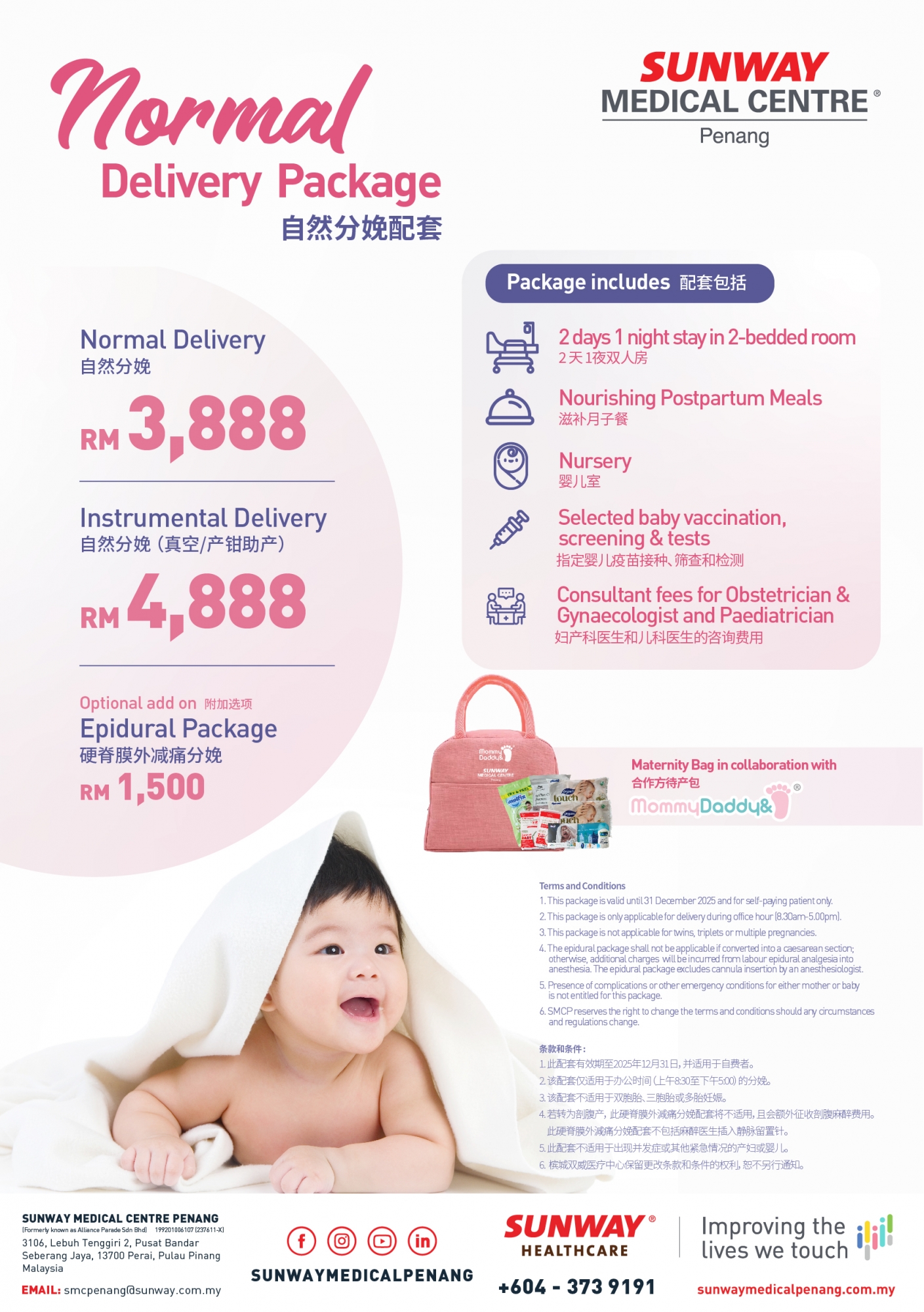Reproductive Health: From Period Pain to PCOS
Article by: Dr. Ann Teoh Ai Yean, Consultant Obstetrician & Gynaecologist
30 May 2025
Reproductive Health: From Period Pain to PCOS
Expert Insights from Dr. Ann Teoh Ai Yean, Consultant Obstetrician & Gynaecologist
Beyond Babies – Understanding Comprehensive Reproductive Health
When people hear 'reproductive health', many think it's just about pregnancy or having babies. But that's only part of the picture.
In reality, reproductive health covers the full scope of women's health — from her very first period (menarche) to life after menopause. It's about understanding how the body works at every stage, recognising when something's off, and knowing what options are available to manage or treat it.

This includes everything from period pain, irregular cycles, and hormonal imbalances to conditions like Polycystic Ovary Syndrome (PCOS), fertility concerns, sexual health, contraception, and more.
To help shed light on these important topics, we've spoken with Dr. Ann Teoh Ai Yean, Consultant Obstetrician & Gynaecologist at Sunway Medical Centre Penang, who brings years of experience in women's health and a deep passion for educating women about their bodies.
In this article, we'll explore what reproductive health really means — and why paying attention to it can make all the difference in your daily life.
Unmasking Common Reproductive Health Conditions
When it comes to reproductive health, many women are taught to "put up with" discomfort — especially when it comes to their periods. But not all symptoms should be dismissed as normal. Understanding the difference between typical and concerning signs is the first step toward getting the right care.
What's a "Normal" Period — and What's Not?

Mild cramping, mood swings, or fatigue during your period can be common. But if your menstrual cycle is severely painful, extremely heavy, irregular, or accompanied by other symptoms like fainting or nausea, it could be a sign of an underlying condition that needs medical attention.
Let's explore some of the most common women's health conditions — many of which are often undiagnosed or misunderstood.
Polycystic Ovary Syndrome

PCOS is a hormonal disorder that affects how the ovaries function. It's one of the most common reproductive health conditions, but also one of the most overlooked.
Common symptoms include:
- Irregular or absent periods
- Acne and oily skin
- Excess hair growth on the face or body (hirsutism)
- Unexplained weight gain or difficulty losing weight
- Difficulty getting pregnant
PCOS can impact daily life in subtle and significant ways — from self-esteem issues due to skin or weight changes, to long-term concerns like insulin resistance or fertility struggles.
Endometriosis

Endometriosis occurs when tissue similar to the uterine lining grows outside the uterus, often on the ovaries, fallopian tubes, or surrounding organs.
Key symptoms:
- Extremely painful periods (dysmenorrhea)
- Pain during or after intercourse
- Chronic pelvic pain
- Difficulty conceiving
This condition can affect a woman's physical and emotional wellbeing, sometimes leading to fatigue, stress, and disruptions in work, relationships, or daily activities.
Other Significant Conditions to Know
Several other reproductive health conditions can also affect a woman's health, fertility, and overall health:
- Fibroids: Non-cancerous growths in or around the uterus.
- Ovarian Cysts: Fluid-filled sacs on the ovaries.
- Pelvic Infections: Infections like Pelvic Inflammatory Disease (PID) can result from untreated STIs or bacteria entering the reproductive tract.
- Early Menopause: Occurring before age 40, early menopause can lead to hot flashes, mood swings, and a higher risk of heart disease or osteoporosis, in addition to ending fertility prematurely.
Why It Matters
These women's health conditions are more than just medical terms — they can deeply affect a woman's day-to-day life, mental health, relationships, and plans for the future. The good news is, many of them are manageable with the right diagnosis and care. If you suspect something's not right with your reproductive health, consult a medical centre near you, or contact Sunway Medical Centre Penang to get an accurate diagnosis.
Reproductive Health Throughout a Woman's Life Stages
A woman's reproductive health isn't static — it changes and evolves over time. From the first period to menopause and beyond, each life stage brings unique physical, emotional, and hormonal shifts. Understanding these transitions helps women make informed decisions about their health at every age.
Reproductive health isn't just about the ability to conceive — it's about the holistic balance of hormones, sexual health, menstrual wellness, emotional well-being, and overall quality of life.
Teen Years: The Start of the Journey
The journey begins with menarche, the onset of a girl's first period, often accompanied by physical and emotional changes driven by fluctuating hormones.
What to expect:
- Irregular cycles are common during the first few years.
- Menstrual cramps, mood swings, or acne may appear.
- Education and reassurance are key to navigating this new phase with confidence.
It's also the time when underlying conditions like primary dysmenorrhea (painful periods) or even early signs of PCOS may emerge. Open conversations and early support can make a lasting difference.
20s to 40s: The Reproductive Prime

This stage is often marked by increased focus on fertility, birth control, and managing reproductive health more proactively. Whether planning a family or choosing to delay or avoid pregnancy, women in this age group often face a wide spectrum of reproductive health decisions.
Common considerations:
- Choosing the right birth control method.
- Tracking ovulation or fertility for family planning.
- Diagnosing and managing conditions like PCOS, endometriosis, or fibroids.
- Understanding the menstrual cycle as a vital sign of overall health.
Work, lifestyle, stress, and emotional wellbeing can also have a real impact on hormonal balance during these years.
40s to 50s & Beyond: Perimenopause and Menopause

As women approach their late 40s and 50s, they may begin the transition known as perimenopause — the lead-up to menopause, when periods eventually stop.
Typical changes include:
- Irregular or skipped periods.
- Hot flushes, night sweats, or mood swings.
- Sleep disturbances or vaginal dryness.
- Changes in libido and energy levels.
Menopause is officially marked when a woman has gone 12 consecutive months without a period. While this signals the end of fertility, it also opens up a new chapter of women's health considerations — including bone density, heart health, and maintaining hormonal balance.
Recognising Warning Signs
One of the most powerful steps a woman can take for her reproductive health is learning to tune into her body. Many symptoms are often dismissed as "normal" or something to endure — but some signs may indicate a deeper issue that shouldn't be ignored.
It's not about worrying over every small discomfort, but about knowing what isn't normal — and feeling empowered to speak up when something feels off.
Here are some warning signs to watch out for:
- Painful or irregular periods: While some cramping is common, intense pain that disrupts daily life or periods that are consistently irregular can signal conditions like endometriosis or PCOS.
- Heavy bleeding: Soaking through pads or tampons every hour or bleeding for more than 7 days may indicate fibroids, hormonal imbalance, or other issues.
- Unusual bleeding: Spotting between periods or bleeding after intercourse should never be brushed aside.
- Unexplained weight gain, acne, or hair loss: These could point to hormonal disorders like PCOS or thyroid imbalances.
- Pain during intercourse: This may be related to endometriosis, infections, or vaginal dryness — and it's always worth discussing with a healthcare provider.
- Difficulty conceiving: If you've been trying to get pregnant for over a year (or 6 months if over 35), it's time to seek professional advice.
- Persistent pelvic pain or abnormal discharge: Ongoing discomfort, pressure, or changes in vaginal discharge may be linked to infections, cysts, or other concerns.
While these symptoms don't always mean something serious, they're your body's way of telling you that something might be out of balance.
Seeking Professional Help: When to See an Obstetrician & Gynaecologist
Taking care of your reproductive health isn't just about addressing issues when they arise — it's about being proactive. Whether you're experiencing symptoms or simply want peace of mind, knowing when to consult an obstetrician & gynaecologist can make a world of difference to your overall wellbeing.
Regular Check-ups Matter

Every woman, regardless of age or stage in life, should schedule annual gynaecological visits. These routine check-ups are essential for:
- Monitoring overall reproductive health
- Early detection of infections or abnormalities
- Cancer screenings, such as the Pap smear (to detect cervical changes) and pelvic exams (to assess organs like the uterus and ovaries)
Even if you feel perfectly healthy, regular health screenings help catch silent issues early.
When to Book a Visit Immediately
Sometimes, your body sends clear signals that something needs urgent attention. Don't delay booking an appointment if you experience:
- Sudden or severe pelvic or abdominal pain
- A missed period accompanied by nausea or breast tenderness (possible pregnancy)
- Foul-smelling or unusual vaginal discharge
- Recurring symptoms linked to PCOS or endometriosis, such as irregular periods, painful cramps, or unexplained weight gain
These signs could indicate a range of conditions — from infections to hormonal disorders — and should be addressed promptly.
Why Early Intervention Matters
Early diagnosis and treatment aren't just about managing discomfort, they can protect your long-term reproductive health, including your ability to conceive in the future.
So whether it's for a routine check-up or a troubling symptom, make your reproductive health a priority. The sooner you act, the more empowered and informed your healthcare provider will be.
A Lifelong Journey of Care
Every stage of a woman's life brings its own challenges and opportunities when it comes to reproductive health. From the first signs of puberty to post-menopausal wellness, regular check-ups and open communication with healthcare provider help ensure that women feel supported, empowered, and informed every step of the way.
Trust your instincts — and if something feels wrong, don't wait. Reaching out to a qualified gynaecologist can make all the difference in getting the answers and care you need. Sunway Medical Centre Penang offers comprehensive men and women's health screening packages to screen for a variety of conditions and symptoms. If you want to know more, each out to Sunway Medical Centre Penang today.
 Back
Back




























